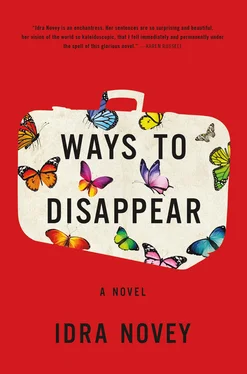Idra Novey
Ways to Disappear
For Leo, for every coast with you
For a time we became the same word. It could not last.
— Edmond Jabès, Translated by Rosmarie Waldrop

In a crumbling park in the crumbling back end of Copacabana, a woman stopped under an almond tree with a suitcase and a cigar. She was a round woman with a knob of gray hair pinned at the nape of her neck. After staring for a minute up into the tree, she bit into her cigar, lifted her suitcase onto the lowest branch, and climbed up after it.
Would you look at that, one of the domino players in the park said as the woman climbed higher, exposing the frayed elastic of her cotton underwear and the dimpled undersides of her thighs.
The domino players were about to break for lunch but didn’t think it was right to leave a woman sitting in an almond tree with a cigar and a suitcase. Julio, the ladies’ man, was selected to investigate. To prepare for the task, he gave a pinch to the tips of his mustache and checked the alignment of his suspenders. At the base of the tree, he looked up and found the woman’s ample behind looming directly over his head. To see the rest of her, he had to shuffle over a step and saw that she had opened a book across her lap as if she were sitting at a train station.
Senhora, could I be of assistance? he asked.
The woman thanked him for inquiring but said she’d been looking forward to this day for some time and was perched there so serenely with her open book and cigar that Julio wished her well and went home for some beans.

Over rice and beans in front of the TV, the Portuguese translator Emma Neufeld told her boyfriend that she was nervous. Her author hadn’t answered her emails in over a week.
Miles told her she spent too much time fretting over unanswered emails. His preferred subject of late was when they might get married, and whether they had to invite everyone in their Road Runners group. He said he was leaning toward an outside venue regardless.
Emma, on the other hand, was leaning toward never.
She had yet to express this.
That evening, an email finally arrived from Brazil but it was not from Beatriz. The sender said his name was Flamenguinho. Was Senhora Neufeld aware, the man inquired, that her author had recently climbed into an almond tree with a suitcase and hadn’t been seen in the five days since then?
Emma drew closer to the screen to make sure she’d read the message correctly. She murmured the words in Portuguese for almond tree and suitcase . For author and disappear. On the shelf in front of her stood the five works of translation that had consumed her life since graduate school. She’d finished one after another with the intensity of an addict. No other translator, in any language, had published as many works by Beatriz.
Downstairs, Miles had begun the nightly preparations for their early run tomorrow. She heard the thump of their sneakers as he placed them by the door, the clink of her keys as he positioned them beside her banana. To leave a person capable of such meticulous devotion was difficult.
She clicked to the weather. Outside their rented, somewhat shabby house in Pittsburgh, it was snowing sideways. In Rio de Janeiro, it was 106 degrees.

On the phone, Raquel Yagoda told her mother’s translator there was no reason for Emma to come to Brazil. It isn’t necessary, she said, and you don’t want to be in the heat wave we’re having now.
Emma continued to insist, however, until Raquel apologized and said that she had to get off the phone. On TV Globo, the news was flashing the same ancient photographs over and over: her mother in a purple polyester pantsuit receiving the Jabuti Prize in 1983, her mother seven months pregnant with Marcus at the book festival in Porto Alegre, her mother in a TV interview when her hair was still dark and thick and her body so thin she folded shut like a fan when she swiveled in a chair.
If you have any information about the South African writer Beatriz Yagoda, the newscaster said, please call the number below.
South African, Raquel repeated, and clicked off the TV. Her mother had left Johannesburg when she was two. Her mother was about as South African as bossa nova.

By the time they reached the Pittsburgh airport, Emma was thinking in Portuguese. Beside her, Miles went on exploding in English about what an unnecessary escapade this trip was. It’s so impulsive, he said, when we have a wedding to pay for.
Emma let him blast on. She was tired of explaining. She didn’t just know Beatriz’s books. She knew the melon color of her author’s bathrobe and which side of the sofa Beatriz preferred when she curled up to read. For the last seven years, Emma had been making an annual pilgrimage with her yearly stipend for language research to see her author. She planned the trips well in advance, and Miles had never given her a hard time about them. He’d never asked much about them either, which she’d come to appreciate. Having never reduced the trips to anecdotes, she could recall them more intuitively as she worked on her translations. She’d remember a morning in Rio as no more than an orange glow over the ocean and use that light to illuminate the strange, dark boats of Beatriz’s images as she ferried them into English.
Miles was wrong. She knew Beatriz too intimately not to go and help now. What if no one else thought of the scene in one of Beatriz’s earliest stories with the warden who disappears into a tree? Emma couldn’t recall the title of it with Miles continuing to detonate beside her in the car. But she was certain that she’d remember it once she was alone in the airport.
And indeed, in the security line, the title came to her. “A Lua Nova.” The New Moon. Once she’d recalled the name, she remembered the whole story, the island with nothing on it but a prison and an orchestra of three-toed lizards that serenade the inmates each night with samba and maracatu. The story was about a mute inmate who whittled chicken bones and the warden who fell in love with him and then poisoned the prisoner, hoping that would extinguish his longing.
But there was a second warden in the story, too. A minor character who climbed a palm tree outside the walls to listen to the lizards and found the distance so freeing, sitting there elevated and unseen, away from the other wardens and their prisoners, that he never came down.
Or maybe there was a suggestion that something more happened in the tree — Emma couldn’t remember. She’d have to find the story when she got to Beatriz’s apartment. If not, the friend who’d been kind enough to write to her about her author’s disappearance would surely have a copy of the collection. Beatriz had never mentioned anyone named Flamenguinho, but he clearly knew Beatriz well enough to know how close she was to Emma. He knew what an asset her American translator would be in a crisis like this. They were going to meet for drinks at Emma’s hotel as soon as she landed. She was so eager to feel the honeyed lilt of Portuguese in her mouth again, the breeze off the Atlantic on her skin.
When she finally emerged from Rio’s Galeão International Airport, she took in the familiar stink of armpits, car exhaust, and guavas that assaulted her as she stepped out of the baggage claim and the outside air pressed in. Already she could feel her dress adhering to her arms and lower back. After so much winter, the sticky sensation, the rising odors were glorious. To arrive in Rio was to remember that one had a body and brought it everywhere.
Читать дальше













